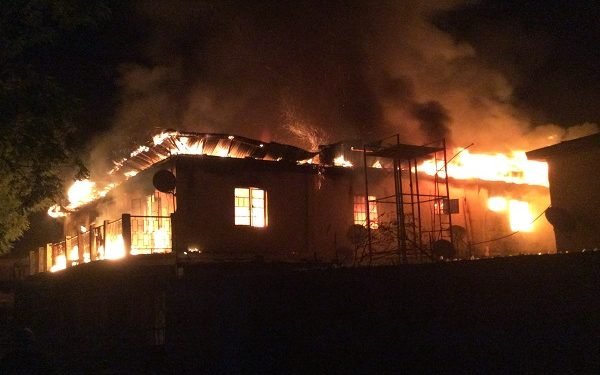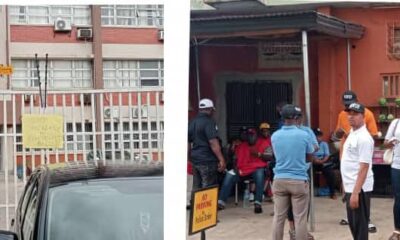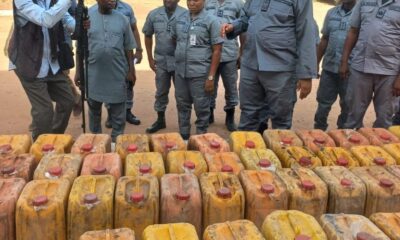News
Why Mothers Of Twins Are Denied Access To Water In Akwa Ibom Community Revealed
Published
10 months agoon
By
Editor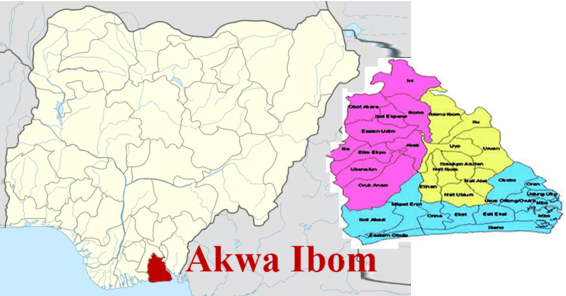
The Coordinator of the Water, Sanitation and Hygiene – Gender Project Team, Prof. Emmanuel Akpabio, on Friday, disclosed that menstruating women and mothers of twin children were not allowed access to drinking water at a community in Akwa Ibom State over beliefs that the water would dry up.
Akpabio, who is the Director, Directorate of International Programmes, University of Uyo, stated this in Uyo while briefing newsmen to highlight the report of the team’s research in three local government areas of Akwa Ibom State.
According to him, the community in the Mbiabet Ikot Udo in Ini Local Government Area of the state has been upholding this belief for decades without being confronted. This is a result of a lack of drinking water and worries that the only source of water in the region might be poisoned.
The professor who noted that the lack of access to WASH constrains women, girls, and other vulnerable individuals from engaging in economic and educational activities called for strong public intervention in providing water for such communities, adding that it would also tackle the problem of open defecation.
READ ALSO: Coup: Seven Moves Tinubu-Led ECOWAS Has Decided To Make Against Niger
“For Mbiabet Ikot Udo, there is only a single source of drinking but stagnant water (idim Affia) sustained through under surface outflow with brown coloration. This serves an estimated population of 1,200 and six more villages (over 6000 people) in the dry season when other available sources would have dried up. This water source is also obtained for domestic and other needs.
“Mothers of twin children are restricted from accessing this water. We were told the stream will spew all manner of impurities and strange substances and gradually dry up anytime it is accessed by a mother of twins, and only comes back to normalcy once sacrifices/rituals are performed by the community.
“Women in their menstrual cycles are also traditionally restricted from having access to the stream and the consequence for violation is prolonged blood discharge. The victims can only get water through their spouses, children, paid services, or voluntary support from members of the community. Where they cannot get any support, they will stay without water for that period,” Akpabio said.
He disclosed that the practice has fuelled gender-based discrimination in access to WASH services and subjected women to psychosocial and other forms of gender-based violence, which would in turn affect their health.
READ ALSO: We Must Reject A Fractured Nigeria – Onaiyekan
According to him, the discrimination was pronounced in ecologically fragile and difficult areas where WASH infrastructure for public use are severely limited, adding that intersectional factors like biology, disability, socio-cultural norms, and economic circumstances also complicate the problem.
“Our attention was drawn to the challenges of menstrual hygiene management (MHM) in the study communities. There have been so much misconception, myths, and gaps in knowledge and awareness around MHM for women and girls.
“When women and girls are denied access to water on account of menstruation, when they have to walk long distances to access WaSH facilities, or when acute water scarcity forces reliance on available but usually of degradable quality sources, their right to decent, hygienic and sanitary living is severely compromised, creating avenues for possibilities for disease outbreaks.
READ ALSO: Anxiety, Fear As Suspected Herders Taker Over Edo Community Farm Roads, Abduct Five
“The stress of having to contend with stigmatisation and extra physical and mental efforts to secure sanitary living translates to serious psychosocial violence.
“MHM needs adequate access to water, soap, sanitary towels, and safe space for using water and changing menstrual towels. A majority of women and girls in our rural areas can neither afford nor have access to these basic necessities.
“When women in their menstrual cycles are denied access to water and safe spaces for menstrual hygiene management as in Mbiabet Ikot Udo, they are directly and indirectly subjected to psychosocial and other forms of gender-based violence, as well as affect their health, as they struggle to make up for such deprivation. Their human dignity is severely violated, and they lack the voice and capacity to surmount such challenges,” Akpabio said.
You may like


Akwa Ibom: Jubilation As Court Sentences Man To Death By Hanging


3 Robbers Shot Dead In Akwa Ibom


CSO Raises Alarm As Akwa Ibom Debt Profile Hits N347.75bn


Akwa Ibom Mothers Get N50,000 For Twins, N100,000 For Triplets


Late Udo Ekpenyong’s Wife, Sister Die As Fire Engulfs Residence


Abducted A’Ibom Judge, Driver Regain Freedom
News
Bauchi Commissioner Gifts 3 Students Cash For Prompt Resumption, Ability To Read
Published
6 hours agoon
May 17, 2024By
Editor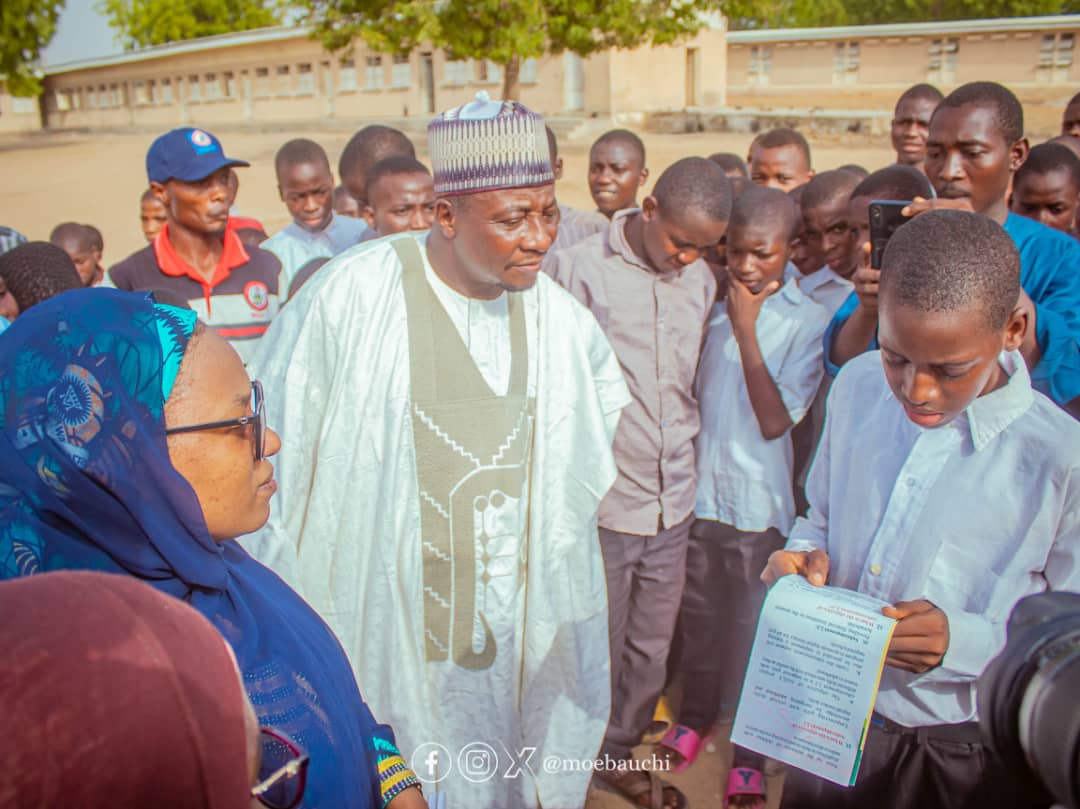
The Bauchi state Commissioner for Education, Dr Jamila Dahiru, on Thursday, gave a cash gift of N5,000 each to three Senior Secondary II students of Government Science Secondary School, Misau for their determination to succeed in Education.
Two of the students, Adamu Adamu, Mustapha and Haruna impressed the commissioner for their presence in school in the first day of resumption while Abdullahi Musa marvelled her for his reading ability and comprehension.
According to the commissioner, the gesture was to appreciate their determination to learn as well and motivate other students to emulate them.
READ ALSO: “They Chase Me I Dey Chase Dream,” Portable Hints On June US Tour
While paying a courtesy visit to the Emir of Misau, Alh. Ahmed Sulaiman, the commissioner disclosed that the Bauchi State government was working with stakeholders from the Misau Emirate to fine-tune modalities of temporarily accommodating the students of Federal Science Technical College, Misau at its Science Secondary School Misau.
She said the college made the request in a letter to the ministry stating that the facility given to them could no longer accommodate their students population, hence the resolve to convene the stakeholders meeting to fine-tune ways of sharing the facility for the betterment of the state.
READ ALSO: FG, States, LGs Share N1.2tn In May
She disclosed that government science secondary school Misau, one of the best in the state in terms of befitting facilities has the capacity to accommodate up to five thousand students, but currently houses about three hundred students.
She appreciated the Emir for his continued support to programmes and policies of the government with more emphasis on the education sector.
Speaking on behalf of the Emir and other stakeholders, a retired Director with the Ministry, Muhammad Musa, expressed gratitude to the Commissioner for the honour and promised to assemble critical stakeholders from the emirate so as to arrive at an acceptable decision for the benefit of all and sundry.
News
NDIC Obtains Order To Wind Down 96 Microfinance, Mortgage Banks
Published
7 hours agoon
May 17, 2024By
Editor
The Nigeria Deposit Insurance Corporation has said that it has obtained Winding up Orders for 96 out of 183 microfinance and primary mortgage banks whose licenses were revoked by the Central Bank of Nigeria in May 2023.
The Managing Director, NDIC, Bello Hassa, revealed this at a sensitisation seminar for Judges of the Federal High Court in Lagos on Thursday organised by the NDIC, to enlighten the judiciary on the intricacies of the banking industry.
Hassan said, “As at date, the Corporation had obtained Winding up Orders for 96 out of 183 Micro Finance and Primary Mortgage Banks whose licenses were revoked by the CBN in May 2023, in less than one Year of revocation.”
READ ALSO: FG, States, LGs Share N1.2tn In May
He added that the NDIC was committed to fulfilling its mandate of protecting depositors through bank supervision, failure resolution and liquidation so as to boost confidence in the financial system.
Speaking on the role that the judiciary plays in the fulfillment of the mandate, Hassan said, “We recognise the judiciary as one of our critical stakeholders. With this, when cases are brought before them, they can receive accelerated hearing and proclamation of Justice.”
Citing some of the achievements from previous editions of the seminar, Hassan said that instances where liquidation-related litigations experienced delays were reduced.

Speakers of the 36 Houses of Assembly in Nigeria on Thursday expressed support for the National Assembly’s ongoing efforts to alter the 1999 constitution to create state policing in the country.
The Speakers made their resolution known at the end of their meeting in Abuja.
The Senate and House of Representatives are currently working to amend various constitutional provisions, including those regarding state police, financial autonomy for local government, fiscal federalism, and mayoral status for the FCT.
READ ALSO: Military Declares Nigerien Terrorist Wanted For Zamfara Killings
Details shortly…

B-I-Z-A-R-R-E! Man Missing For 26 Years Found Alive In Neighbour’s House

Bauchi Commissioner Gifts 3 Students Cash For Prompt Resumption, Ability To Read

NDIC Obtains Order To Wind Down 96 Microfinance, Mortgage Banks
Trending

 Headline3 days ago
Headline3 days agoLady Arrested For Allegedly Harassing, Cyberstalking Crown Prince Of Benin Kingdom [VIDEO]

 News5 days ago
News5 days agoTobi Amusan Becomes World’s Fastest Woman With New Track Record

 News3 days ago
News3 days agoEdo Govt Takes Custody Of 4-year-old Girl Used For Adult Content

 Headline3 days ago
Headline3 days ago32-year-old Nigerian Doctor Killed In US, Father Mourns

 News4 days ago
News4 days agoBREAKING: Organised Labour Shut BEDC Head Office

 Entertainment2 days ago
Entertainment2 days agoVIDEO: Drama As Portable Jumps Gate To Evade Police Arrest

 News3 days ago
News3 days agoMan Arrested For Invading Plateau Bank With Bomb

 Metro5 days ago
Metro5 days agoCustoms Intercepts N10m Worth Petrol En Route Cameroon Illegally

 News3 days ago
News3 days agoSee Lagos Environment Commissioner’s Funny Reply To Resident’s Complaint About Neighbours Moaning Loudly At Night

 Headline3 days ago
Headline3 days ago‘You’re Guilty’ – Judge Roars, Jailed UK-based Nigerian Pastor, Wife 34 Years For Raping, Assaulting Members
